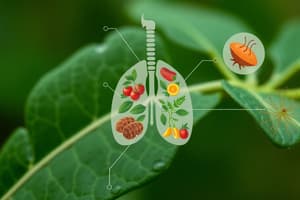Podcast
Questions and Answers
Which of the following is a type of heterotrophic nutrition?
Which of the following is a type of heterotrophic nutrition?
- Plant producing glucose
- Photosynthesis
- Fungi deriving nutrients from decaying matter (correct)
- Fermentation
Aerobic respiration occurs without the use of oxygen.
Aerobic respiration occurs without the use of oxygen.
False (B)
What is the main purpose of excretion in living organisms?
What is the main purpose of excretion in living organisms?
To remove waste products from metabolism.
Organisms that produce their own food through photosynthesis are known as __________ organisms.
Organisms that produce their own food through photosynthesis are known as __________ organisms.
Match the life process with its definition:
Match the life process with its definition:
Which life process involves the movement of substances like nutrients and waste within an organism?
Which life process involves the movement of substances like nutrients and waste within an organism?
All forms of reproduction require two parents.
All forms of reproduction require two parents.
What is an example of a voluntary movement in animals?
What is an example of a voluntary movement in animals?
The process by which organisms convert food into energy, typically involving oxygen, is called __________.
The process by which organisms convert food into energy, typically involving oxygen, is called __________.
Which life process is crucial for maintaining homeostasis?
Which life process is crucial for maintaining homeostasis?
Flashcards are hidden until you start studying
Study Notes
Life Processes
-
Definition: Life processes are essential functions that living organisms perform to maintain life.
-
Key Life Processes:
-
Nutrition:
- The intake of nutrients for energy, growth, and repair.
- Types:
- Autotrophic: Organisms produce their own food (e.g., plants).
- Heterotrophic: Organisms obtain food from other organisms (e.g., animals).
-
Respiration:
- The biochemical process of converting food into energy.
- Types:
- Aerobic: Requires oxygen (e.g., cellular respiration).
- Anaerobic: Occurs without oxygen (e.g., fermentation).
-
Transport:
- Movement of substances (nutrients, gases, waste) within an organism.
- Involves systems like circulatory (in animals) and vascular (in plants).
-
Excretion:
- The removal of waste products from metabolism.
- Important for maintaining homeostasis.
-
Growth:
- Increase in size and mass due to cell division and differentiation.
- Involves both physical growth and cellular development.
-
Reproduction:
- The process of producing offspring.
- Types:
- Asexual: Involves one parent (e.g., binary fission, budding).
- Sexual: Involves two parents (e.g., fertilization).
-
Response to Stimuli:
- Organisms react to changes in their environment.
- Can be immediate (reflexes) or longer-term adaptations.
-
Movement:
- Ability to change position or place.
- Can be voluntary (e.g., animals moving) or involuntary (e.g., plants growing toward light).
-
-
Importance of Life Processes:
- Essential for the survival and reproduction of organisms.
- Enable organisms to adapt to their environments and sustain life functions.
Life Processes
- Definition: Essential functions that living organisms perform to maintain life
- Key Life Processes:
Nutrition
- Intake of nutrients for energy, growth, and repair
- Autotrophic: Organisms produce their own food (e.g., plants)
- Heterotrophic: Organisms obtain food from other organisms (e.g., animals)
Respiration
- Biochemical process of converting food into energy
- Aerobic: Requires oxygen (e.g., cellular respiration)
- Anaerobic: Occurs without oxygen (e.g., fermentation)
Transport
- Movement of substances (nutrients, gases, waste) within an organism
- Involves systems like circulatory (in animals) and vascular (in plants)
Excretion
- Removal of waste products from metabolism
- Important for maintaining homeostasis
Growth
- Increase in size and mass due to cell division and differentiation
- Involves both physical growth and cellular development
Reproduction
- Process of producing offspring
- Asexual: Involves one parent (e.g., binary fission, budding)
- Sexual: Involves two parents (e.g., fertilization)
Response to Stimuli
- Organisms react to changes in their environment
- Can be immediate (reflexes) or longer-term adaptations
Movement
- Ability to change position or place
- Can be voluntary (e.g., animals moving) or involuntary (e.g., plants growing toward light)
- Importance of Life Processes:
- Essential for the survival and reproduction of organisms
- Enable organisms to adapt to their environments and sustain life functions
Studying That Suits You
Use AI to generate personalized quizzes and flashcards to suit your learning preferences.




